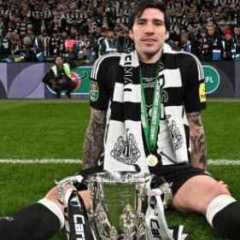-
Posts
6025 -
Joined
-
Last visited
-
Days Won
6
Everything posted by ohhh_yeah
-
just in case you or another poster has not seen it yet...
-
This window is so bizarre. In years past when asked for my favorite transfer, I have had to answer with an outgoing, shite player's name or have very few names to pick that was brought in. Who do I pick out of this crop of new players though? This group has a lot of quality! Excited for the future!
-
He showed up to training today for my local side, the Portland Timbers. Wonder if he is still shite six years later.
-
freeport and sao paulo for me...
-
-
and Giroud.
-
"Michael Owen has been identified as a candidate to play for Shabab next season and we are in negotiations with his management team." "The player's agent is in Dubai to close the deal." "We are in talks with the player and his agent, but no agreement has yet been reached between the parties." "Things should become clear soon."
-
http://platformlondon.org/2012/06/26/blowing-the-whistle-on-sunderland-fcs-oil-sponsorship-deal/
-
-
http://youtu.be/BhVoLMWH6hk
-

The Official Liverpool FC vs Newcastle United FC Match Thread
ohhh_yeah replied to Monroe Transfer's topic in Newcastle Forum
http://i.imgur.com/I4CPN.jpg -
why can we only post one video at a time now? http://youtu.be/wBujoJpDxo0
-
his new video...
-
Got really stoned this morning and then made the following. A huge pot of clam chowder, smoked and then braised four racks of ribs, roasted brussel sprouts with garlic, chilies, and lime juice. Deep fried shrimp and then added them to my fried rice. The rice also had red bell peppers, onions, pineapple, and chives. Prepared a spinach-artichoke-jalapeno dip, Put the dip on slices of fresh bread and topped it with some parmesan cheese before putting it in the oven to melt the cheese. Stuffed belly and now sitting back sipping on some whiskey while puffing on a cigar. Happy holidays to you all!
-
Had a first date last night with this cute chick I work with. I bought quite a few 22 oz. smoked porter beers and we went to a local park. I brought along the following that I made. Sliced some focaccia in half. Deep-fried oysters, crispy bacon, blanched spinach, and sauteed mushrooms were all put on the focaccia bread. I then put two slices of pepperjack cheese on top of that. Then I got more focaccia bread. On that bread I put some beer braised pulled pork on it. I then added coleslaw, two onion rings, crispy bacon, and smoked porter bbq sauce. I then put two slices of white cheddar cheese on top of that. All four of the sandwiches were then put in the oven on a sheet pan until the cheese melted. I also made some garlic fries. We go out again this Saturday.
-
i posted several years ago how a bunch of us at a house party put a shock collar on the first person who passed out. then carried him to the end of the driveway and set him in the street. watching him running around trying to find a safe zone was hilarious.
-
Bendtner.
-
This week Barack Obama told an invited audience at Rio de Janeiro’s Municpal Theatre that it is Brazil that is the shining example that Libya should seek to emulate in its struggle to rid itself of its tyrannical ruler. “Brazil”, Obama declared, is “a country that shows how a call for change that starts in the streets can transform a city, a country, and the world”. Curiously, an equally charismatic Brazilian with his own interest in politics has been expressing similar opinions in an entirely different context for quite some time. “Brazil is like a new born country” he beamed through his distinctive beard, now greying with age, before adding “everyone who visits Brazil falls in love with the place.” He was right to be proud. This man is legendary midfielder Socrates Brasileiro Sampaio de Souza Vieira de Oliveira, and as the captain of the Brazilian side in Spain in 1982, and as a lynchpin of the immortal 1986 side – widely regarded as two of the finest teams never to win the World Cup – Socrates is better placed than many to eulogise over the virtues of the award of the 2014 World Cup to his homeland. Whilst the Brazil of today is far from free of problems, its progress in the last decade is remarkable. True dramatic improvements need to be made to both stadia and infrastructure in the next three years if a successful tournament is to place, and true huge steps still have to be taken to tackle poverty and unemployment, yet there is nevertheless the welcome urgency of progress in the air, and the considerable excitement at the thought of the World Cup coming back to Brazil has gripped the public. As Socrates himself remarks, “The world will get to see our perfections and imperfections as a nation.” But for Socrates and those of his generation old enough to remember the reign of the military government that controlled the country for over twenty years between 1964 and 1985, the modern, economically powerful nation that Brazil has become represents the culmination of a long struggle. It is here that Obama makes his point, championing Brazil as a pillar of hope, with words that resonate around the world. But, as the military’s control over Brazil began to fade over twenty-five years ago, Socrates was spreading his own, similar, message, and using his incredible talent as a footballer to further his cause. For a country that is completely obsessed with football it is telling that a footballer and a football club came to challenge the establishment in this way. As one of South America’s most popular clubs, forged in the working class districts of Sao Paulo over a hundred years ago, Corinthians has long been regarded as an institution of the people. Socrates too is indelibly linked with the club, as his 297 appearances and 172 goals for Corinthians made him one of the team’s, and his country’s, all-time greats. However Socrates would come to represent so much more than a cultured midfielder of the highest order to the people of Brazil. Already a well educated man and a vehement opponent of the ruling military government, Socrates – along with Corinthian’s teammate Wladimir – established the Corinthians Democracy Movement in the early 1980s that would become a form of protest against the military’s control and a tool to spread their message of the power of democracy. With the full backing of club president Waldemar Pires, Socrates and his colleagues took control of Corinthians and established a fully democratic approach to all team issues. “Everyone at the club had the same right to vote – the person who looked after the kit and the club president, all their votes had the same weight” Socrates explained. This organisation was established in part to challenge the over-baring and intrusive culture that existed in Brazilian football at the time. Players were strictly regimented, not just in their training and approach to the game but even with regards to their private lives, and Corinthians Democracy was intended to challenge these principles. But it grew to represent the struggle of a country fighting for political change. As Socrates offers; “It brought a conscience to the people that you could vote and change things – it made people realise together with other movements that were happening in the country that you could make change.” The government they rebelled against had swept to power in 1964 when a military coup had overthrown the democratically elected left-wing President João Goulart. The military had initially acted with the intention over-seeing political and economic reform, however hardliners within the forces seized control and began purging those who opposed them, imposing a fierce dictatorship. But by the early 1980s the military’s power was waning, and the final ruling dictator João Figueiredo had even pledged to open Brazil up to democracy. However hardcore factions of the military loyal to the government responded with a series of bombings that shook a country already in the midst of economic decay that had seen widespread strikes and protests. Corinthians were a superb side at the time, winning the Sao Paulo state championship in 1982 and 1983, and their blend of stylish, attacking football married with the political campaigning of Socrates and his colleagues captured the imagination of many. To spread their message the Corinthians Democracy Movement emblazoned the clubs kits with political slogans on match days, and huge pro-democracy banners were erected at their Pacaembu stadium. The movement also attracted the support of artists and intellectuals, as the political left latched onto the power of football in spreading the message for change. In 1982, despite warnings from the Brazilian Football Confederation (CBF) not to interfere in political issues, the Corinthians Democracy Movement agreed that the club would take to the field in shirts bearing the slogan “Vote on the Fifteenth”, urging Brazilian citizens to make their voice heard in the upcoming elections. By 1985 the military’s rule had ended, but it left behind a country ravaged by terrorist attacks, spiralling debt and rising inflation. The Corinthians Democracy Movement had played its part in bringing about change, and curiously, one of its own has since led Brazil to the forefront of the world. President Luiz Inácio Lula da Silva – known commonly as ‘Lula’ – rose from humble beginnings to serve as the thirty-fifth President of Brazil between 2003 and 2011. A lifelong Corinthians fan, Lula was heavily involved in the Union activities of the 1970s and 1980s that, along with organisations such as the Corinthians Democracy Movement, brought about reform. As President, Lula was immensely popular and guided Brazil to its place as the world’s eighth-largest economy, bringing millions out of poverty and into work, and attracting the World Cup back to South America for the first time in nearly forty years. Today the fight for democracy again dominates the headlines as not just Libya, but large swathes of the Middle-East and North Africa have been plunged into the chaos of political unrest. It is perhaps, then, more pertinent than ever to remind ourselves that political and social change are not earned exclusively down the barrel of a gun. As a creative art form of mass global appeal football can – and does – have the power to change the world, and it is of critical importance that we honour those such as Socrates and who used the game as a vehicle for change, particularly now, when so much of the world would benefit from the message of these great individuals. Posted: March 27, 2011 http://fiveinmidfield.com
-
You're joking, right? yes. but i have had a strong hatred for woodgate since he broke on the scene. nails on chalk board for me. drogba territory...

